
The Best AI Homework Helpers in 2025: Smarter Tools for Students, Coders, and Self-Learners
Discover top AI tools for students, coders, and self-learners—from code debugging to essay writing and exam prep. These platforms support smarter, more efficient learning across subjects and study styles.
Published On: 30 July, 2024
4 min read
Table of Contents
- 1. CodeGPT — Ask Anything While You Code
- 2. Edubrain AI — Learn as You Solve, Not Just Copy
- 3. Getsolved AI — Guided Learning, Not Just Answers
- 4. Khanmigo — A Personal AI Tutor from Khan Academy
- 5. TutorEva — Advanced AI for College-Level Study Help
- 6. Studyable — Active Recall, Flashcards, and Peer Study Sets
- 7. Grammarly — Make Your Writing Smarter
- Comparison Table: Which Tool Should You Use?
- Conclusion: Use the Right Tool for the Right Purpose
What used to sound like science fiction is now just another thing in the toolbox — AI’s helping students handle confusing material and get through the week.
Debugging Python, prepping for exams, outlining an essay — whatever the task, students are folding smart tools into their routines. For developers especially, editor add-ons now offer help right where the work happens, with tips and fixes that don’t break the flow.
This article outlines the most effective AI-powered platforms for students, self-learners, and early-career coders. The tools selected cover a range of use cases, including problem-solving, code completion, writing assistance, and exam prep.
We’ve highlighted not just the strengths of each tool, but also where they fit in real learning routines and how to avoid relying on them too much. It’s about understanding the boundary between support and shortcuts.
Let’s dive into the best AI helpers worth trying today.
1. CodeGPT — Ask Anything While You Code
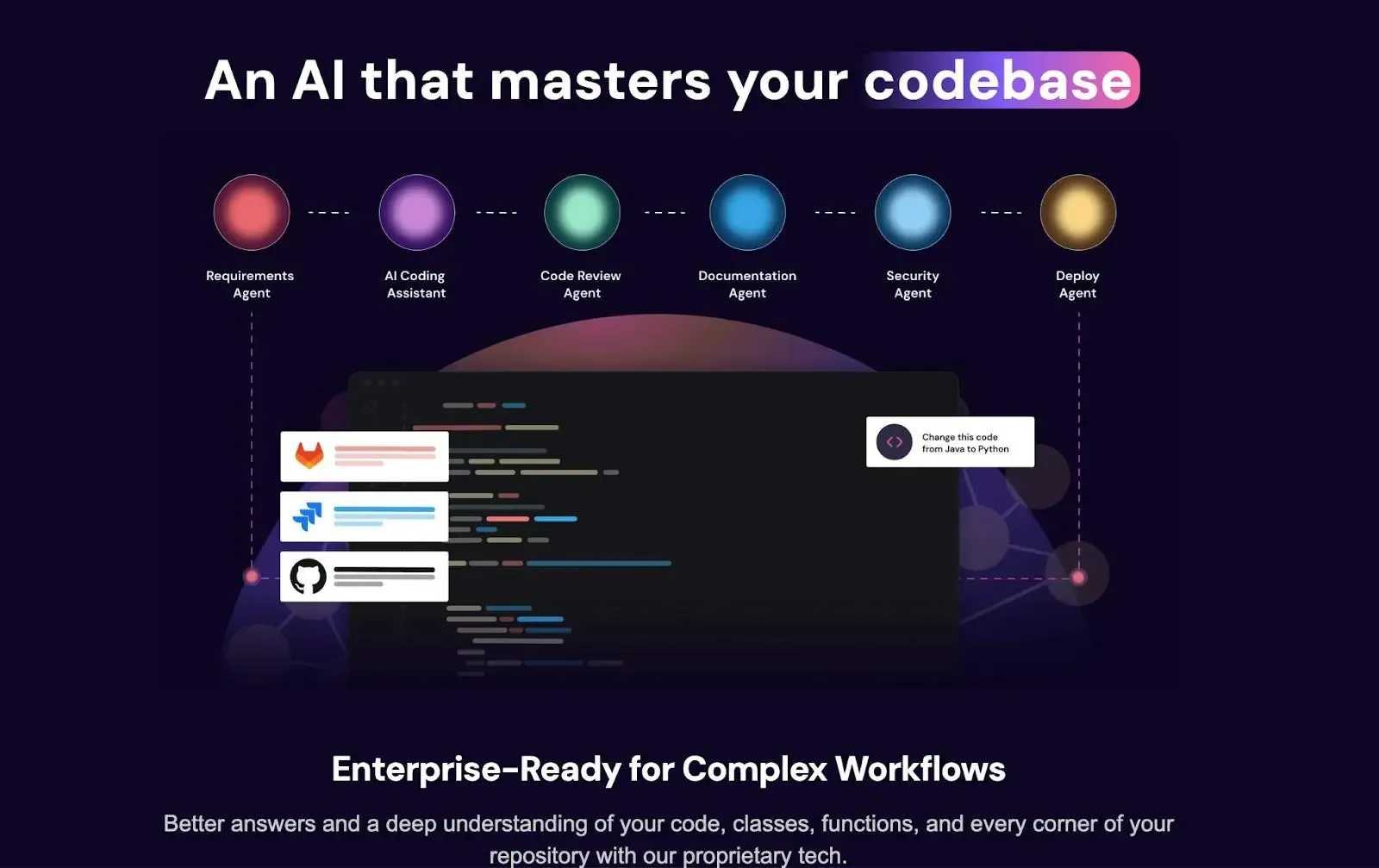
Best for: AI explanations and live support inside your coding environment
Overview:
CodeGPT is a handy VS Code extension that brings AI support directly into your coding space. You can debug, ask for explanations, or get help improving code — all without switching tabs.
Key Benefits:
- Provides natural-language explanations for complex logic
- Suggests fixes, generates test cases, and explains errors
- Learns from the prompt history to offer more relevant responses
- Useful for both learning and productivity
Ideal Use Case:
- Troubleshooting a recursive function
- Asking for help writing test coverage or documenting a block
Comparison Highlight:
Unlike Google Code Assist, another devs’ AI tool designed to predict and complete, CodeGPT responds to custom questions, making it more exploratory and flexible.
Limitations:
- May encourage overreliance if used instead of reasoning through problems
- Accuracy depends on prompt clarity
Note: Best used as an interactive learning partner, not a replacement for understanding foundational programming logic.
2. Edubrain AI — Learn as You Solve, Not Just Copy
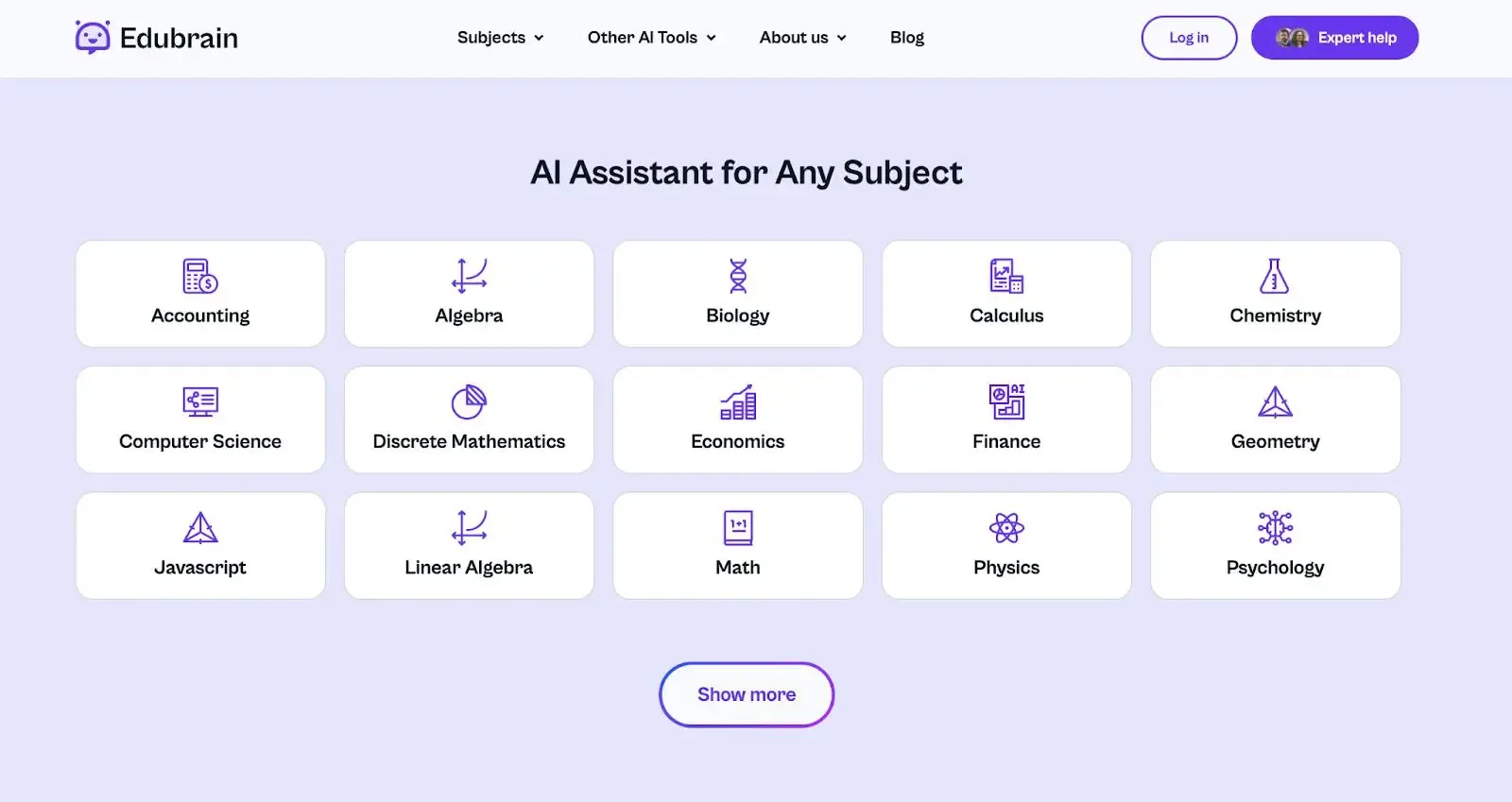
Best for: Students who want to understand concepts deeply, not just complete assignments
Overview:
Edubrain AI delivers full academic support, step-by-step learning across all academic subjects, with a strong focus on math and science. Unlike some AI tools that simply provide quick homework answers, this solver explains the “why” and “how” behind every part of the solution.
Key Benefits:
- Free access to detailed solutions for school and college homework questions
- Supports multiple subjects, including STEM fields and humanities
- Accepts inputs via text, images, PDFs, and other file types, making it versatile for different homework formats
- Includes additional AI tools such as an AI Answer Generator, Flashcard Maker, Notes Generator, and Presentation Maker to assist in comprehensive study and project work
- Offers research assistance and educational blog content to guide users through common college challenges
Ideal Use Case:
- Exam preparation through in-depth problem review
- Catching up on missed lessons or complex topics
- Structured learning that promotes active engagement rather than shortcutting
Comparison Note:
Unlike coding helpers like CodeGPT or general tutors like Khanmigo, Edubrain focuses on giving broad academic support that helps students really understand their subjects and study in different ways.
3. Getsolved AI — Guided Learning, Not Just Answers
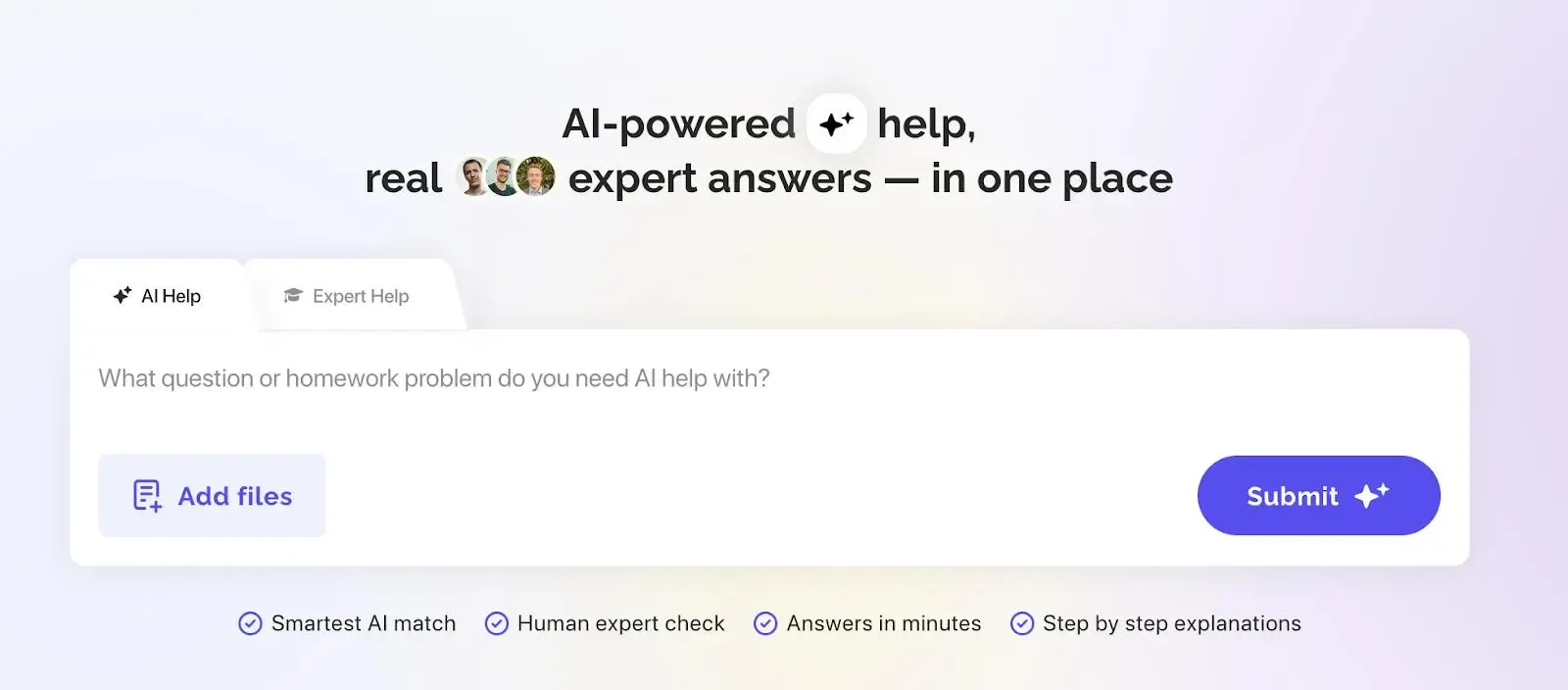
Best for: Deep understanding in STEM through adaptive, personalized tutoring
Overview:
Getsolved AI goes beyond quick answers. Here, you can request expert help when needed, and each stage of the problem is explained in plain language until it makes sense.
Strengths:
- Ideal for structured exam prep with tailored learning paths
- Promotes clear, step-by-step solutions for different academic levels
- Covers multiple subjects, from STEM to humanities
- Provides research assistance
- Expert help available on request, ensuring real support when concepts feel tough
Limitations:
- Users might need extra review of the solutions or follow up with expert help before tests
- Best suited for academic learning, not advanced research
Comparison Tip: Unlike flashcard tools like Studyable or answer-focused AI like TutorEva, Getsolved supports mastery through active learning and structured guidance.
Integration Tip: Pair with tools like Edubrain for explanation-rich problem-solving across subjects.
4. Khanmigo — A Personal AI Tutor from Khan Academy
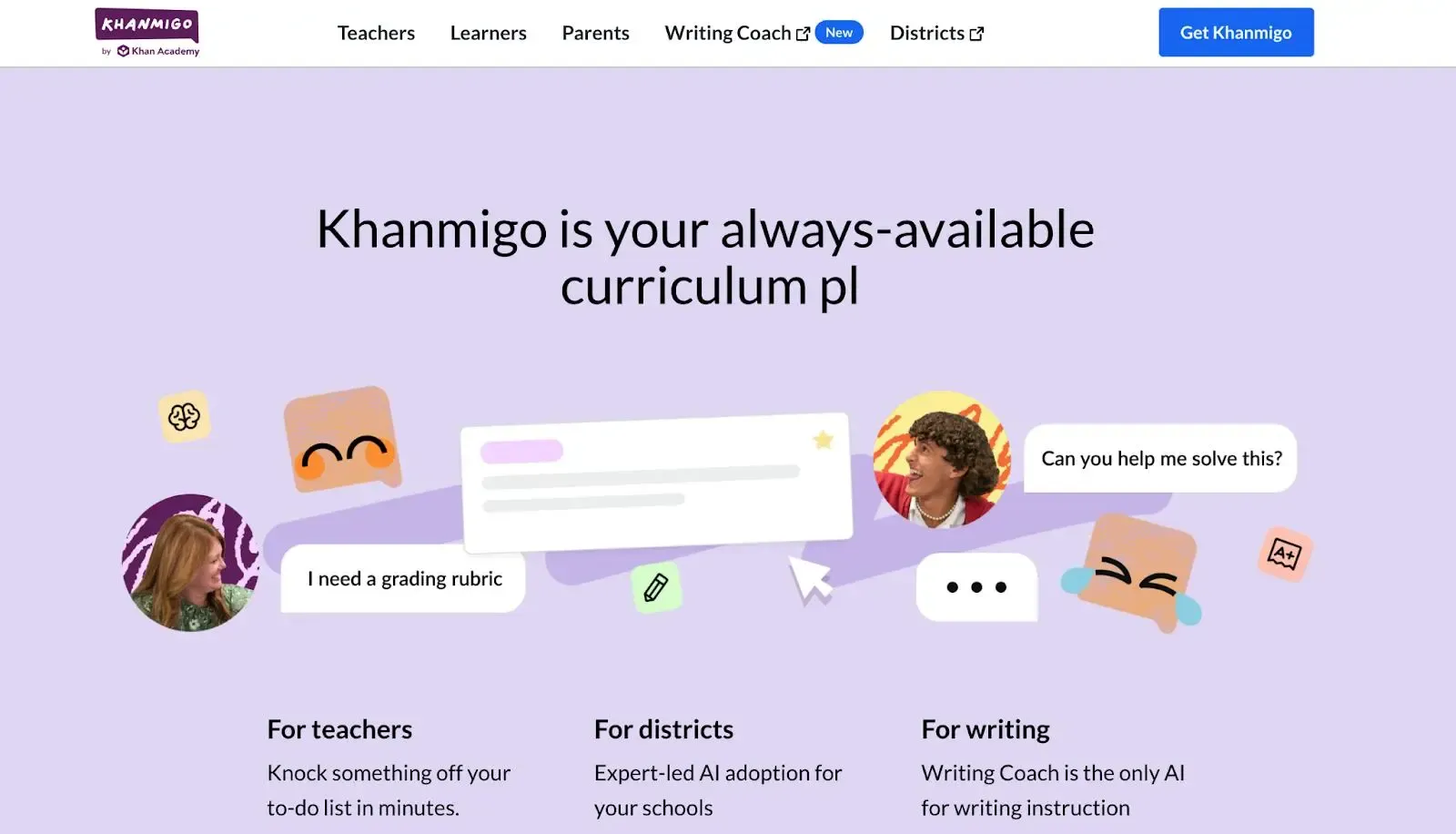
Best for: Structured learning across multiple subjects
Overview:
Khanmigo is an AI-powered tutor integrated into the Khan Academy platform. It guides learners through topics by building on Khan Academy’s existing curriculum, offering interactive help without replacing the learning process itself.
Key Benefits:
- Breaks down complex topics into digestible explanations
- Supports a wide range of subjects: math, grammar, history, and introductory coding
- Encourages active thinking through prompts and follow-up questions
- Sets structured paths with goals and checkpoints
Ideal Use Case:
- Working through algebra problems with feedback
- Reinforcing grammar rules in context
- Exploring foundational programming concepts
Limitations:
- Functions best within the Khan ecosystem — not suited for solving out-of-context or highly advanced problems
Note:
Khanmigo is designed to teach through dialogue and exploration, not provide shortcuts — learning happens along the way.
5. TutorEva — Advanced AI for College-Level Study Help
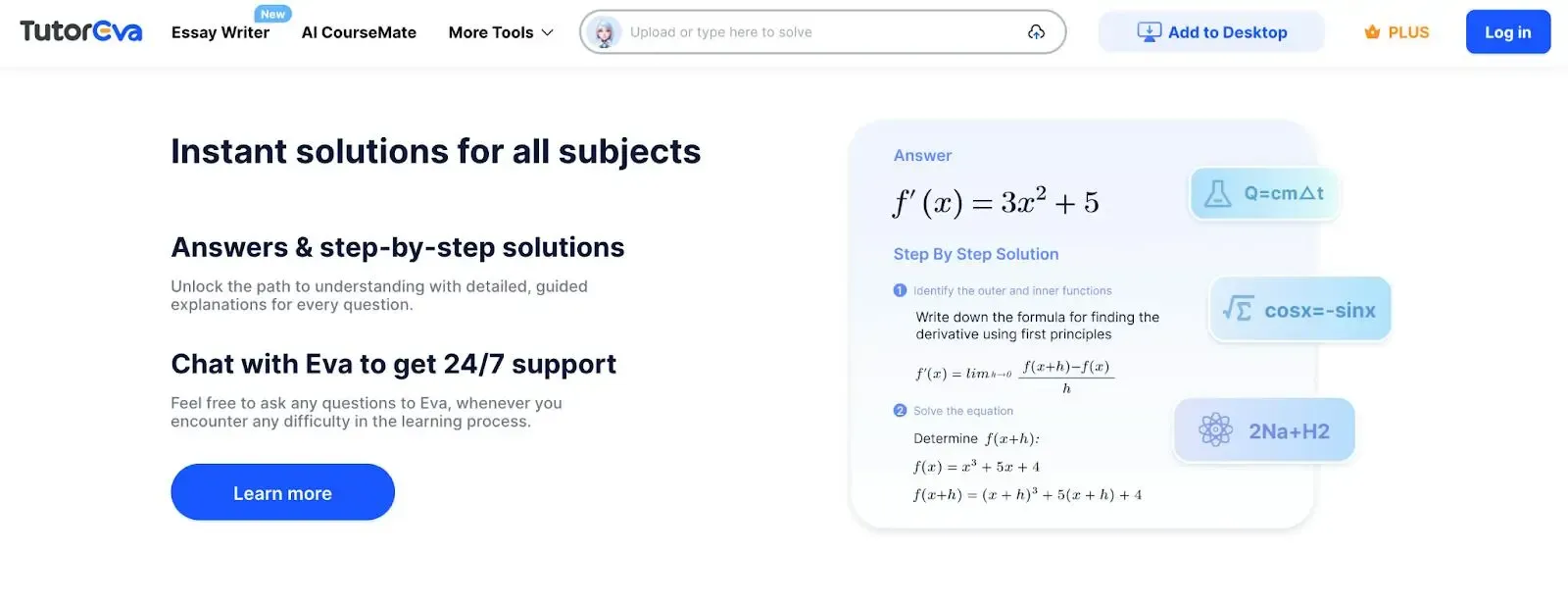
Best for: College students needing 24/7 homework and exam support
Overview:
TutorEva is an AI-driven academic assistant tailored for college coursework. With its proprietary Knowledge Agent System, TutorEva offers around 15–20% higher accuracy than GPT-4 when solving problems. Using “Snap & Solve,” students upload images or PDFs of their work and get step-by-step explanations, video tutorials, and customized feedback.
Key Benefits:
- Supports subjects like calculus, chemistry, accounting, and essay writing
- Features an interactive AI tutor that adapts to individual learning styles
- Offers GPA-focused tools via its CourseMate study companion
- Accepts input in multiple formats (text, images, PDFs)
Ideal Use Case:
- Solving math or science problems with detailed guidance
- Preparing for exams with structured plans and performance tracking
Limitations:
- Best suited for college-level academics; less relevant for niche or non-academic tasks
- Accuracy depends on the quality of the uploaded content
Comparison Highlight:
TutorEva excels in college-level tutoring, offering deeper academic support than coding tools or general platforms like Khanmigo.
6. Studyable — Active Recall, Flashcards, and Peer Study Sets
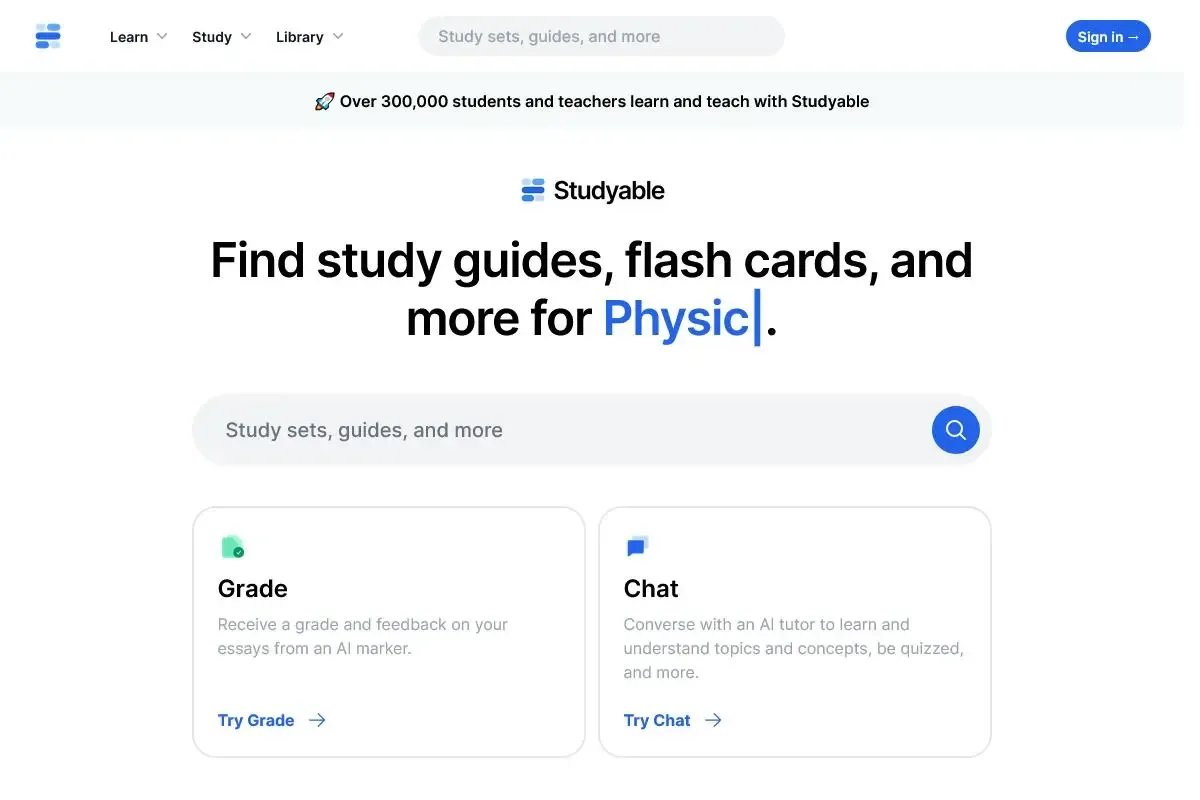
Best for: Memorization and standardized test preparation
Overview:
Studyable is an AI-enhanced platform designed to improve retention through active recall techniques. It focuses on custom flashcards, spaced repetition, and collaborative study sets, helping students reinforce key concepts over time.
Key Benefits:
- Ideal for memorizing definitions, vocabulary, formulas, and facts
- Particularly useful for standardized tests like the SAT, AP Biology, or language exams
- Enables peer sharing and group study to boost motivation and understanding
Ideal Use Case:
- Reviewing large volumes of factual information
- Building long-term retention through spaced repetition cycles
Limitations:
- Does not provide problem-solving or step-by-step explanations
- Best used in combination with tools that focus on understanding and application
Integration Tip:
Pair Studyable with platforms like Edubrain or Khanmigo to cover both memorization and concept mastery in a complete study routine.
7. Grammarly — Make Your Writing Smarter
Best for: Writing clarity, grammar, tone control, and content originality
Overview:
Grammarly is a comprehensive writing assistant that not only corrects grammar and spelling but also enhances clarity and adjusts tone to suit your audience. It flags repetitive phrasing and overused words, helping your writing sound more natural. Its built-in plagiarism checker also supports content originality.
Key Benefits:
- Improves essays, reports, emails, and documentation with clear, professional language
- Offers tone suggestions, useful for formal assignments
- Detects redundancy to improve clarity and flags potential plagiarism
- Supports native and non-native English speakers alike
Ideal Use Case:
- Polishing academic papers, cover letters, or professional communication
- Ensuring originality and balanced keyword usage in writing
Limitations:
- Does not create content from scratch like TutorEva or Edubrain
- Best suited as a refinement and quality control tool rather than a full writing tutor
Integration Tip:
Use Grammarly alongside other tools to draft and refine your writing, ensuring both strong content and polished final output.
Comparison Table: Which Tool Should You Use?
|
Tool |
Best For |
Cons |
Paid or Not |
Focus Area |
|
CodeGPT |
Fast code solutions, debugging |
Not for non-coding tasks |
Freemium |
Coding |
|
Edubrain AI |
Solving math/science problems with clear explanations |
Focused on accuracy — best for structured questions |
Free + optional tools |
STEM subjects + humanities |
|
Getsolved AI |
Guided learning, concept mastery |
Slower-paced, effort required |
Subscription-based |
Deep STEM tutoring |
|
Khanmigo |
Support tied to Khan Academy lessons |
U.S.-centric, invite-only |
Free (invite-only) |
General tutoring |
|
TutorEva |
Fast homework help with AI explanations |
May oversimplify; less depth |
Mostly free |
Homework assistance |
|
Studyable |
Flashcards, summaries, memorization |
Less depth, more recall-based |
Freemium |
Study tools |
|
Grammarly |
Grammar and adjusting style |
Doesn’t teach subject matter |
Freemium |
Writing support |
Conclusion: Use the Right Tool for the Right Purpose
Effective learning starts with clear objectives. Once you know what you’re aiming for, the right tool naturally follows.
With so many AI options available, it’s no longer about finding one solution for everything, but choosing purposefully. There’s a tool for deep focus, another for quick review, and others for refining or exploring. Let your goals lead you, and the tools can do what they do best — support your learning.
Don’t Have Time To Read Now? Download It For Later.
Table of Contents
- 1. CodeGPT — Ask Anything While You Code
- 2. Edubrain AI — Learn as You Solve, Not Just Copy
- 3. Getsolved AI — Guided Learning, Not Just Answers
- 4. Khanmigo — A Personal AI Tutor from Khan Academy
- 5. TutorEva — Advanced AI for College-Level Study Help
- 6. Studyable — Active Recall, Flashcards, and Peer Study Sets
- 7. Grammarly — Make Your Writing Smarter
- Comparison Table: Which Tool Should You Use?
- Conclusion: Use the Right Tool for the Right Purpose
What used to sound like science fiction is now just another thing in the toolbox — AI’s helping students handle confusing material and get through the week.
Debugging Python, prepping for exams, outlining an essay — whatever the task, students are folding smart tools into their routines. For developers especially, editor add-ons now offer help right where the work happens, with tips and fixes that don’t break the flow.
This article outlines the most effective AI-powered platforms for students, self-learners, and early-career coders. The tools selected cover a range of use cases, including problem-solving, code completion, writing assistance, and exam prep.
We’ve highlighted not just the strengths of each tool, but also where they fit in real learning routines and how to avoid relying on them too much. It’s about understanding the boundary between support and shortcuts.
Let’s dive into the best AI helpers worth trying today.
1. CodeGPT — Ask Anything While You Code

Best for: AI explanations and live support inside your coding environment
Overview:
CodeGPT is a handy VS Code extension that brings AI support directly into your coding space. You can debug, ask for explanations, or get help improving code — all without switching tabs.
Key Benefits:
- Provides natural-language explanations for complex logic
- Suggests fixes, generates test cases, and explains errors
- Learns from the prompt history to offer more relevant responses
- Useful for both learning and productivity
Ideal Use Case:
- Troubleshooting a recursive function
- Asking for help writing test coverage or documenting a block
Comparison Highlight:
Unlike Google Code Assist, another devs’ AI tool designed to predict and complete, CodeGPT responds to custom questions, making it more exploratory and flexible.
Limitations:
- May encourage overreliance if used instead of reasoning through problems
- Accuracy depends on prompt clarity
Note: Best used as an interactive learning partner, not a replacement for understanding foundational programming logic.
2. Edubrain AI — Learn as You Solve, Not Just Copy

Best for: Students who want to understand concepts deeply, not just complete assignments
Overview:
Edubrain AI delivers full academic support, step-by-step learning across all academic subjects, with a strong focus on math and science. Unlike some AI tools that simply provide quick homework answers, this solver explains the “why” and “how” behind every part of the solution.
Key Benefits:
- Free access to detailed solutions for school and college homework questions
- Supports multiple subjects, including STEM fields and humanities
- Accepts inputs via text, images, PDFs, and other file types, making it versatile for different homework formats
- Includes additional AI tools such as an AI Answer Generator, Flashcard Maker, Notes Generator, and Presentation Maker to assist in comprehensive study and project work
- Offers research assistance and educational blog content to guide users through common college challenges
Ideal Use Case:
- Exam preparation through in-depth problem review
- Catching up on missed lessons or complex topics
- Structured learning that promotes active engagement rather than shortcutting
Comparison Note:
Unlike coding helpers like CodeGPT or general tutors like Khanmigo, Edubrain focuses on giving broad academic support that helps students really understand their subjects and study in different ways.
3. Getsolved AI — Guided Learning, Not Just Answers

Best for: Deep understanding in STEM through adaptive, personalized tutoring
Overview:
Getsolved AI goes beyond quick answers. Here, you can request expert help when needed, and each stage of the problem is explained in plain language until it makes sense.
Strengths:
- Ideal for structured exam prep with tailored learning paths
- Promotes clear, step-by-step solutions for different academic levels
- Covers multiple subjects, from STEM to humanities
- Provides research assistance
- Expert help available on request, ensuring real support when concepts feel tough
Limitations:
- Users might need extra review of the solutions or follow up with expert help before tests
- Best suited for academic learning, not advanced research
Comparison Tip: Unlike flashcard tools like Studyable or answer-focused AI like TutorEva, Getsolved supports mastery through active learning and structured guidance.
Integration Tip: Pair with tools like Edubrain for explanation-rich problem-solving across subjects.
4. Khanmigo — A Personal AI Tutor from Khan Academy

Best for: Structured learning across multiple subjects
Overview:
Khanmigo is an AI-powered tutor integrated into the Khan Academy platform. It guides learners through topics by building on Khan Academy’s existing curriculum, offering interactive help without replacing the learning process itself.
Key Benefits:
- Breaks down complex topics into digestible explanations
- Supports a wide range of subjects: math, grammar, history, and introductory coding
- Encourages active thinking through prompts and follow-up questions
- Sets structured paths with goals and checkpoints
Ideal Use Case:
- Working through algebra problems with feedback
- Reinforcing grammar rules in context
- Exploring foundational programming concepts
Limitations:
- Functions best within the Khan ecosystem — not suited for solving out-of-context or highly advanced problems
Note:
Khanmigo is designed to teach through dialogue and exploration, not provide shortcuts — learning happens along the way.
5. TutorEva — Advanced AI for College-Level Study Help

Best for: College students needing 24/7 homework and exam support
Overview:
TutorEva is an AI-driven academic assistant tailored for college coursework. With its proprietary Knowledge Agent System, TutorEva offers around 15–20% higher accuracy than GPT-4 when solving problems. Using “Snap & Solve,” students upload images or PDFs of their work and get step-by-step explanations, video tutorials, and customized feedback.
Key Benefits:
- Supports subjects like calculus, chemistry, accounting, and essay writing
- Features an interactive AI tutor that adapts to individual learning styles
- Offers GPA-focused tools via its CourseMate study companion
- Accepts input in multiple formats (text, images, PDFs)
Ideal Use Case:
- Solving math or science problems with detailed guidance
- Preparing for exams with structured plans and performance tracking
Limitations:
- Best suited for college-level academics; less relevant for niche or non-academic tasks
- Accuracy depends on the quality of the uploaded content
Comparison Highlight:
TutorEva excels in college-level tutoring, offering deeper academic support than coding tools or general platforms like Khanmigo.
6. Studyable — Active Recall, Flashcards, and Peer Study Sets

Best for: Memorization and standardized test preparation
Overview:
Studyable is an AI-enhanced platform designed to improve retention through active recall techniques. It focuses on custom flashcards, spaced repetition, and collaborative study sets, helping students reinforce key concepts over time.
Key Benefits:
- Ideal for memorizing definitions, vocabulary, formulas, and facts
- Particularly useful for standardized tests like the SAT, AP Biology, or language exams
- Enables peer sharing and group study to boost motivation and understanding
Ideal Use Case:
- Reviewing large volumes of factual information
- Building long-term retention through spaced repetition cycles
Limitations:
- Does not provide problem-solving or step-by-step explanations
- Best used in combination with tools that focus on understanding and application
Integration Tip:
Pair Studyable with platforms like Edubrain or Khanmigo to cover both memorization and concept mastery in a complete study routine.
7. Grammarly — Make Your Writing Smarter
Best for: Writing clarity, grammar, tone control, and content originality
Overview:
Grammarly is a comprehensive writing assistant that not only corrects grammar and spelling but also enhances clarity and adjusts tone to suit your audience. It flags repetitive phrasing and overused words, helping your writing sound more natural. Its built-in plagiarism checker also supports content originality.
Key Benefits:
- Improves essays, reports, emails, and documentation with clear, professional language
- Offers tone suggestions, useful for formal assignments
- Detects redundancy to improve clarity and flags potential plagiarism
- Supports native and non-native English speakers alike
Ideal Use Case:
- Polishing academic papers, cover letters, or professional communication
- Ensuring originality and balanced keyword usage in writing
Limitations:
- Does not create content from scratch like TutorEva or Edubrain
- Best suited as a refinement and quality control tool rather than a full writing tutor
Integration Tip:
Use Grammarly alongside other tools to draft and refine your writing, ensuring both strong content and polished final output.
Comparison Table: Which Tool Should You Use?
|
Tool |
Best For |
Cons |
Paid or Not |
Focus Area |
|
CodeGPT |
Fast code solutions, debugging |
Not for non-coding tasks |
Freemium |
Coding |
|
Edubrain AI |
Solving math/science problems with clear explanations |
Focused on accuracy — best for structured questions |
Free + optional tools |
STEM subjects + humanities |
|
Getsolved AI |
Guided learning, concept mastery |
Slower-paced, effort required |
Subscription-based |
Deep STEM tutoring |
|
Khanmigo |
Support tied to Khan Academy lessons |
U.S.-centric, invite-only |
Free (invite-only) |
General tutoring |
|
TutorEva |
Fast homework help with AI explanations |
May oversimplify; less depth |
Mostly free |
Homework assistance |
|
Studyable |
Flashcards, summaries, memorization |
Less depth, more recall-based |
Freemium |
Study tools |
|
Grammarly |
Grammar and adjusting style |
Doesn’t teach subject matter |
Freemium |
Writing support |
Conclusion: Use the Right Tool for the Right Purpose
Effective learning starts with clear objectives. Once you know what you’re aiming for, the right tool naturally follows.
With so many AI options available, it’s no longer about finding one solution for everything, but choosing purposefully. There’s a tool for deep focus, another for quick review, and others for refining or exploring. Let your goals lead you, and the tools can do what they do best — support your learning.
Frequently Asked Questions
Are AI learning tools reliable for exam preparation?
Yes, many tools like Edubrain and Getsolved AI are designed with structured revision paths and concept reinforcement, making them effective for targeted exam prep.
Can these tools replace teachers or human help?
No, they’re best seen as supplements — great for practice, explanation, or feedback, but not substitutes for personalized teaching, especially in complex or emotional learning contexts.
Do they help prevent plagiarism?
Some, like Grammarly and Edubrain, include originality checks or citation support, which can help guide students toward ethical writing practices.
What’s the difference between fast-answer tools and conceptual tools?
Fast-answer tools like TutorEva or Studyable aim for quick problem-solving, while platforms like Edubrain or Getsolved AI focus on building understanding over time.
Do they adapt to different learning styles?
Many now do. Getsolved AI and Edubrain, for instance, personalize guidance based on student memory patterns, progress, and preferred input modes.
Share to:

Written By:
Harram ShahidHarram is like a walking encyclopedia who loves to write about various genres but at the t... Know more
Get Help From Experts At InvoZone In This Domain
